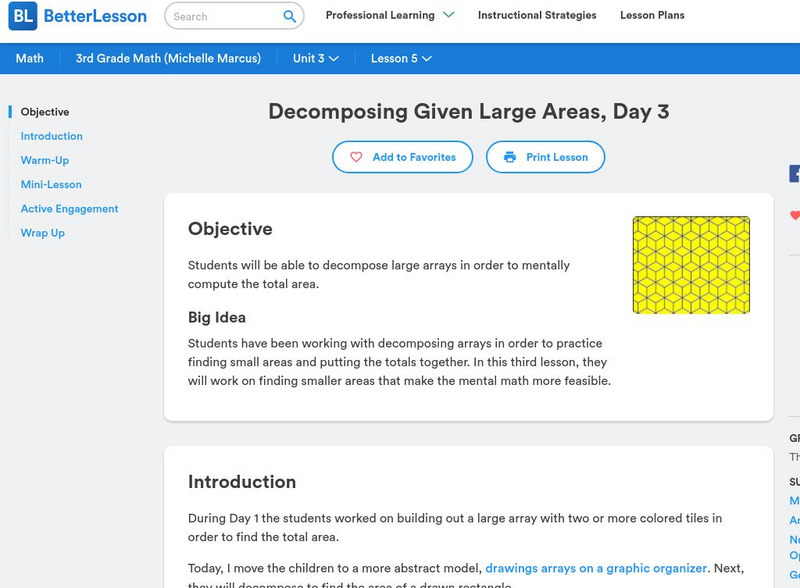Better Lesson
Better Lesson: Quiz: Adding, Subtracting, Multiplying, & Dividing Decimals
Assess progress in calculating with decimals.
Better Lesson
Better Lesson: Mastering Division Involving Decimal Quantities
Students divide decimal quantities and apply this knowledge to real world situations.
Better Lesson
Better Lesson: Mastering Division
Students divide multi-digit whole number quantities.
Better Lesson
Better Lesson: Moving Along With Talking Moves
Third graders always want to share! This instructional activity allows us to create a routine where everyone is safe in sharing their thinking and comfortable responding to another's presentation of understanding.
Better Lesson
Better Lesson: Defend Your Ideas With a Journal
Third graders practice in representing their mathematical thinking in order to share it with others and assess their own understanding. This lesson engages them to work out a problem from a story read to them in more than one way.
Better Lesson
Better Lesson: Distributive Property
A Distribution Collusion: Obtaining the secrets to successfully using the distributive property.
Better Lesson
Better Lesson: Greatest Common Factor & Least Common Multiple
Clearly understand the difference between factors and multiples builds a foundation for applications and problem solving using GCF and LCM.
Better Lesson
Better Lesson: Dividing With Fractions
Sixth graders model division using whole numbers and fractions and divide whole numbers and fractions using the standard algorithm.
Better Lesson
Better Lesson: Divisibility Rules for 6 and 9
Sixth graders use calculators to find the shortcut for dividing with 6 and 9.
Better Lesson
Better Lesson: Divisibility Rule for 4 and 5
Using calculators allows students to experiment and to discover patterns, in this case resulting in a divisibility rule for the number 4.
Better Lesson
Better Lesson: Naming Arrays
After partners have worked with each other and have some practice creating arrays, it is time to challenge them to define the concept demonstrated by an array and how it can be used to solve problems.
Better Lesson
Better Lesson: Oh Baloney! Incorporating Large Numbers Into Tall Tales
Fourth graders write and read aloud an exaggerated story using multi-digit numbers up to 1,000,000.
Better Lesson
Better Lesson: Musical Fractions an Introduction
Third graders use math, music and technology in this engaging lesson on fractions!
Better Lesson
Better Lesson: Winter Olympics: Non Standard Measurement
We are going for GOLD! Students will use different objects to measure the length achieved in different Olympic events.
Better Lesson
Better Lesson: Unit Assessment on Measurement Concepts
Move over Van Halen because today we are all going to "Jump." So go ahead and jump as students solve an assessment piece and story problems involving jump lengths. If you are under 30, please Google Van Halen before proceeding.
Better Lesson
Better Lesson: Making New Shapes With Shapes
My first graders have been studying the defining attributes of 2D shapes. They are going to love using toothpicks and marshmallows to present their knowledge of 2D and create 3D shapes.
Better Lesson
Better Lesson: Identifying Plane Shapes
First graders begin to learn about plane shapes in Kindergarten. This lesson will serve as review of plane shapes' characteristics and extend into practice in categorizing shapes by defining attributes.
Better Lesson
Better Lesson: Looking at the Similarities and Differences
La, La, La, La, La, sing a happy song! You will be signing like a Smurf as students use their new founded knowledge of shape characteristics to participate in a whole group discussion and to successfully participate in geometric learning.
Better Lesson
Better Lesson: Introducing Quadrilaterals
A big word for a big idea! After being introduced to the term quadrilateral, the students will learn the characteristics of them and have an opportunity to create various quadrilaterals.
Better Lesson
Better Lesson: Talking About Triangles
Let's talk about shapes baby. Let's talk about vertices. Leeettsss talk about all the things that triangles need to be, Oh let's talk abbbooouuut shapes! It's not Salt N Peppa but you can get your groove on with today's triangle talk.
Better Lesson
Better Lesson: Assessing Composing and Decomposing Shapes
Knowledge in Action! Today you will find out if the students are understanding the idea of decomposing and composing shapes with pattern blocks.
Better Lesson
Better Lesson: Chrysanthemum: Shorter and Longer Names
To introduce these terms, 1st graders get to learn a little mouse with a LONG name! After reading Chrysanthemum, students look at how long all of their names are and use the terms, "shorter, equal to and longer than" to compare the lengths.
Better Lesson
Better Lesson: Building With Shapes
I love blending art and math. I want my students to develop a depth of knowledge for 2D plane shapes and distinguish polygon from non-polygon shapes.
Better Lesson
Better Lesson: Decomposing Given Large Areas, Day 3
Third graders work with decomposing arrays in order to practice finding small areas and putting the totals together. In this third lesson, they will work on finding smaller areas that make mental math more feasible.

